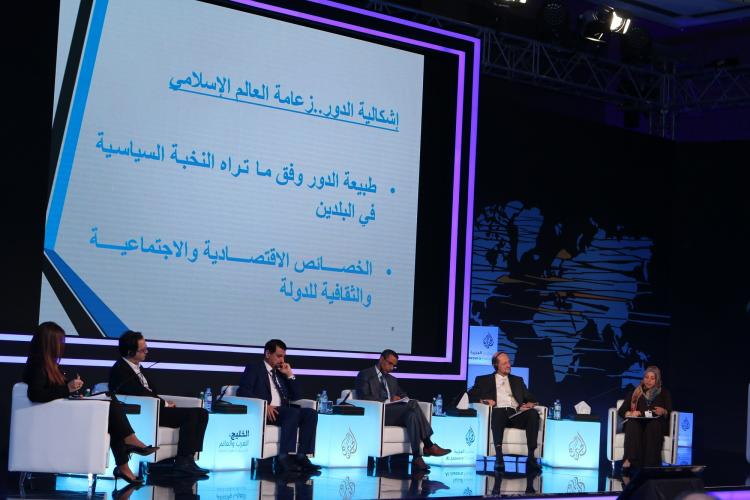
The theme of the second session of the 12th Al Jazeera Forum was “Iran and the Gulf between cooperation, competition and confrontation”. Its speakers were Kayhan Barzegar, Director of the Center for Middle East Strategic Studies (CMESS) in Tehran; Abdullah Basil Hussein, Deputy Director of the Iraqi Center for Research and Strategic Studies in Amman; Yemeni MP Abdul Karim Aslami; Fatima Alsmadi, Senior Researcher at Al Jazeera Center for Studies and the Head of Iranian Studies; and Boris Zala, Member of the Foreign Affairs Committee of the European Parliament.
The speakers examined relations between the Gulf States and Iran in light of the current circumstances in the region and the challenges facing its stability. They also touched on the impact of these relations on the conflict in Yemen.
Explaining why Arab-Iranian relations have not seen any substantial progress, Hussein said that the history of these relations has been characterised by struggle and conflict since 1979. He added that the Arab countries’ problem with Iran is largely attributed to the fact that the latter adopted “the revolutionary” approach in its interaction with the Arab states, while it maintained a different attitude with the West.
Abdul Karim Aslami discussed Arab-Iranian relations and the factors driving the conflict in the region. He maintained that Iran derives its policies in the region from a combination of political interests and ideological faith-based determinants. He cited the current situation in Yemen as an example, as both the Gulf and Iran interfere in its affairs thus turning Yemen into a battleground and the Yemenis into tools.
In her contribution, Fatima Alsmadi focused on Saudi-Iranian relations as a source of great concern not only regarding the future of the Gulf, but the entire Middle East. Referring to historical incidents as the violence that violence that took place during the pilgrimage season of 1979, she said that the essence of conflict between the two sides is geopolitical and not doctrinal. She pointed out that the conflict in Yemen is a major issue at the center of the current conflicts, and that the problems pertaining to Yemen will increase due to the absence of feasible political solutions. Based on a study she conducted on statements made by a number of decision makers in Iran, Alsmadi predicted that the conflict and tension will prevail in the future of the relations.
On the other hand, Kayhan Barzegar said that Iran “is not the main source of instability in the region". He maintained that while there are a lot of tensions linked to Iran, “we should regard these tensions from the Iranian perspective." He added that what some people regard as an Iranian presence in the region is due to geopolitical challenges that pose a threat to Iran’s national security, such as the Islamic State and the US bases in neighbouring countries. He said, “there is a need to understand the Iranian presence from the perspective of local discourse, as the government is facing several challenges in the region”.
Boris Zala stressed the importance of managing the differences and discrepancies among countries in the region, so as to ensure that they do not escalate into wars. He said that everyone focuses on the United States as a key player in the crisis based on the perception that a final solution to the geopolitical game is war; and that the United States is the largest military force in the world and will not hesitate to interfere for the sake of its interests.

